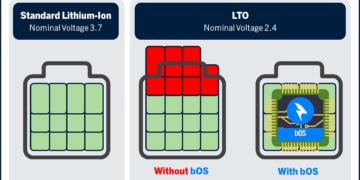Running a retail or e-commerce store without an integrated Point of Sale (POS) system is virtually unthinkable today. While the POS terminal market in the US is set to reach $22.56 billion by 2025, the global POS software market is expected to reach $42.5 billion by 2027.
However, despite the popularity of standard POS systems, they do have their limitations. Here’s where an integrated POS system comes in. In its simplest form, an integrated POS system is a platform which connects all purchase-sales with your other business apps so they can exchange data seamlessly between themselves.
Integrated POS systems offer several advantages over non-integrated ones. For example:
| Integrated POS systems | Non-integrated POS systems |
|---|---|
| Payment processor speaks to POS | Payment processor does not speak to POS |
| POS automatically syncs payment amount to terminal thus reducing the scope of human error | Payment amount needs to be manually entered on the terminal thus increasing the chances of human error |
| Transactions are automatically marked as “paid” | Transactions must be manually marked as “paid” |
| Fewer steps in the checkout process | More steps in the checkout process |
| Logs customer information and other useful data for marketing/promotion | Only logs that a sale happened and a card was used to pay for it |
| Provides a better customer experience and reduces the risk of fraud | Provides a less than optimal customer experience and increases the risk of fraud |
| Does not require extra spend on external card processing devices | Requires extra spend on external card processing devices |
| Saves time and improves efficiency through automation | Manual intervention takes more time and is less efficient |
How a fully integrated POS system can help your business
POS integrations can help you manage and improve all areas of your business. From automated product inventory checks and receiving multiple payment types, to storing customer shopping preferences and even managing your receipt paper output, helping your business to go green.
These are just some of the tasks that an integrated POS system handles to streamline your operations. Each task can help to improve on overall customer experience and ultimately, build customer loyalty. This frees up your team’s mental load to offer the highest standards of customer service, everyday.
Beyond improving the checkout process, an integrated POS system can give you valuable insights into the behavior and purchase patterns of your customers. You can leverage such data on the shop or café floor, but it can also be shared with internal UX analysts, brand marketers, and pricing teams to help inform marketing campaigns and increase profitability.
Let’s dig a little deeper into the benefits of integrated POS systems.
Easy POS integration
Besides e-commerce and payment processor integration, integrated POS systems can seamlessly connect with other third-party apps including marketing automation software, accounting software, loyalty management systems, etc.
Improved efficiency
Integrated merchant services including integrated credit card processing eliminates the need for manual entry during checkout. This not only saves time but also reduces the probability of human errors. What’s more, integrated card processing makes your end-of-day reconciliation much easier.
Better security
POS e-commerce integration ensures that your customers don’t need to be redirected to an external landing page to provide their payment information. In addition, payment processor integration adds some extra layers of security that minimizes the risk of online fraud.
Improved cashflow and insights
Integrated credit/debit card processing ensures that you can process payments in real-time. There are no delays on account of manual entry and no delays in fund transfers to your account (when the volume of transactions is high), meaning you can likely take more sales in a day too.
Also, integrating your POS with your accounting software can give you access to valuable data and insights. With QuickBooks POS integration, for example, you can view your sales and financial data in one place so you can make better business decisions.
Using integrated POS data to build customer loyalty

One of the biggest benefits of integrated POS systems is that they facilitate exceptional customer experiences that boost loyalty. By integrating your CRM and/or marketing automation software with your POS system, you can get access to valuable insights into the preferences and behavior of your customers.
For example, you could keep track of the products they buy most often or the ones they’ve added to their wishlist and send them personalized product recommendations. In a retail setting, your staff can use such information to make relevant suggestions suited to their interests.
You can also leverage the data you have to create loyalty programs and targeted marketing campaigns. Personalized offers, recommendations, reminders and rewards can go a long way in encouraging your customers to make repeat purchases, boosting loyalty and retention.
Besides all of this, an integrated POS system also helps you keep track of your best-selling products so you can manage your inventory efficiently. This can prevent your customers’ favorite items from going out of stock and keep them happy.
Sellers who use Square Loyalty see a 40% increase in customer visit frequency.
– Square POS
Many integrated POS companies, like Square POS, offer a in-built digital loyalty program so you don’t even have to think about creating one yourself. Square’s loyalty program is based on the customer’s number, proving a great way to turn new customers into brand loyalists.
The customer receives a text alert every time they spend with your business through Square POS, notifying them of their rewards activity. Meanwhile, business owners like you can store this activity and create customer reports to develop spending insights.
Using integrated POS to personalize and upsell

An integrated POS system can offer substantial benefits when it comes to upselling or cross-selling. For example, based on the insights you gather from your customers’ purchase patterns (or browsing history on your e-commerce store), you can recommend similar or complementary products that might be relevant.
Let’s say you run a restaurant or eatery and use a POS system. When your POS system is integrated with your CRM, you get access to information such as how often a customer visits your establishment, the time of day or month when they usually visit, and the items they usually order.
Using such information, you can create successful data-driven product suggestions which easily convert to sales. As they’re based on unique insight and understanding of the customer’s lifestyle needs, such product suggestions are likely to come off as naturally helpful instead of a hard-sell.
Personalization can even be called a “hygiene factor”: customers take it for granted, but if a retailer gets it wrong, customers may depart for a competitor.
McKinsey
You could also share special offers on their favorite items or exclusive discounts, each ready for their regular weekly or monthly visit. On occasions such as birthdays, or customer loyalty anniversaries you can celebrate their patronage by rewarding them with extra store credit which they can redeem on their next visit.
Personalized, data-driven offers can greatly increase the likelihood of your customers responding to them. The financial cost of a customer being fond of your business versus favouring it is huge. Think about it, do your customers have an affinity for your business or have they fully bought into it as Apple loyalists have bought into the Apple brand?
Overtime, personalized marketing equates to you building an individual brand relationship with each customer. This has a long-term effect on boosting sales and offer conversions, ultimately improving your marketing ROI.
Personalization is so helpful in sales conversions, consulting giant McKinsey reported in 2020, “Personalization can even be called a “hygiene factor”: customers take it for granted, but if a retailer gets it wrong, customers may depart for a competitor.”
Does your POS provider fully integrate?
Now we’ve shone a light on all the benefits a fully integrated POS system can offer your business, you may be wondering just how suitable your current POS system is. After all, how long has it been since you last replaced your POS system?
But before you rush out to choose a new POS system with integration, be sure to check it integrates with your existing systems first. Usually, their website should reveal such information. For example, Zettle lists all of its POS and e-commerce integrations on its website.

Final thoughts
The purpose of an integrated POS system is to ensure uninterrupted communication between your POS and other third-party platforms, used daily business. When done right, a full POS integration can help you improve operational efficiency and provide exceptional customer experiences that keep them coming back.
It can also give you visibility into sales, marketing, and financial data all in one place that helps you with better decision-making. Follow the tips mentioned above to leverage your integrated POS and take your business to newer heights.














